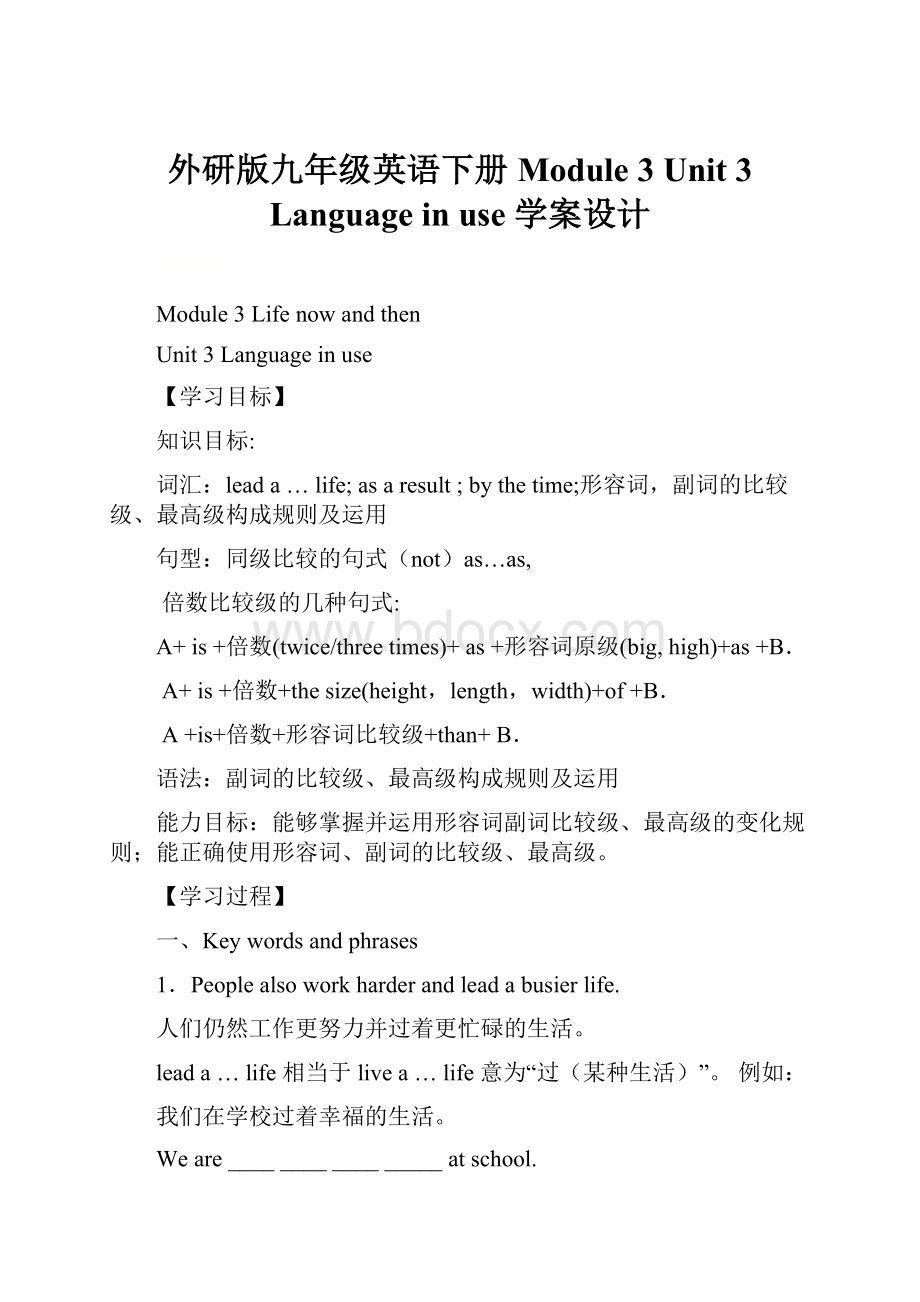外研版九年级英语下册Module 3 Unit 3 Language in use学案设计.docx
《外研版九年级英语下册Module 3 Unit 3 Language in use学案设计.docx》由会员分享,可在线阅读,更多相关《外研版九年级英语下册Module 3 Unit 3 Language in use学案设计.docx(16页珍藏版)》请在冰豆网上搜索。

外研版九年级英语下册Module3Unit3Languageinuse学案设计
Module3Lifenowandthen
Unit3Languageinuse
【学习目标】
知识目标:
词汇:
leada…life;asaresult;bythetime;形容词,副词的比较级、最高级构成规则及运用
句型:
同级比较的句式(not)as…as,
倍数比较级的几种句式:
A+is+倍数(twice/threetimes)+as+形容词原级(big,high)+as+B.
A+is+倍数+thesize(height,length,width)+of+B.
A+is+倍数+形容词比较级+than+B.
语法:
副词的比较级、最高级构成规则及运用
能力目标:
能够掌握并运用形容词副词比较级、最高级的变化规则;能正确使用形容词、副词的比较级、最高级。
【学习过程】
一、Keywordsandphrases
1.Peoplealsoworkharderandleadabusierlife.
人们仍然工作更努力并过着更忙碌的生活。
leada…life相当于livea…life意为“过(某种生活)”。
例如:
我们在学校过着幸福的生活。
Weare_________________atschool.
2.Peopleputtheirrubbishoutsideinthestreet.Asaresult,thereweremanydiseases.
人们把垃圾扔在大街上。
结果。
产生了许多疾病。
asaresult因此,结果
asaresultof因为由于,作为…的结果;=becauseof
Hedidn’tworkhard.________,hefailedintheexam.
他不努力学习,结果没有通过考试。
Hepassedtheexam____________workinghard.
他努力学习,因此通过了考试。
3.bythetime到……的时候,相当于when
BythetimeIgothome,myparentshadfallenasleep.
我到家时,我父母已经入睡了。
I.单项选择
1.ThepeopleinChina_____ahappylifenowadays.
A.haveB.takeC.leadD.lives
2.Iwas______readanewspaperarticleaboutlifeintheuniversity.
A.interestingtoB.interestedtoC.interestinginD.interestedin
3.Halfofthebooks____lostyesterday.
A.wasB.wereC.getD.havebeen
4.Hecan’tgotoworkanymorebecauseofhisheart_____.
A.illnessB.sickC.illD.disease
5.Couldyouhelpme_____whentheplanewilltakeoff?
A.lookoutB.getoutC.findoutD.takeout
II.根据要求,完成句子。
1.Theschoolisverybeautiful.Westudiedintheschool.(合并成一句)
Theschool_______________isverybeautiful.
2.Doyouknowtheboysittingbytheriver?
(改为复合句)
Doyouknowtheboy_______________bytheriver?
3.Haveyou___________(听说)thedecision?
4.Pleasetakemoreoutdooractivities.Youshouldn’tjuststudyindoors.(合并成一句)
Pleasetakemoreoutdooractivities_________juststudyingindoors.
5.Hehadtocareforhisyoungerbrotherathome.(同义句)
Hehadto______________hisyoungerbrotherathome.
III.任务型阅读
Co-operation(合作)isalwaysneededwhenyoumakeaprojectthattheteachergivesyou.First,discussallyouwouldliketodowithyourclassmates.Chooseoneofthememberstowritedownwhatyou’retalkingabout.Then,withtheideasyouget,listallyouwant.Everyonesharesthedutyfortheproject.YoucancollectinformationnotonlyformbooksbutalsoontheInternet.Makingasurvey(调查)anddoingaresearcharealsogoodways.Afterthat,allthemembersputwhathasbeenfoundtogether.Trytomaketheprojectmorewell-organized.Intheend,youcangiveareportinfrontofyourclasstoshowtheresultsofyourhardwork.
任务一:
根据英文释义及首字母提示,拼写单词
1.i_______plan;opinion
2.s_______use,payorhavesomethingwithothers
任务二:
同义句转换,每空一词
YoucancollectinformationnotonlybooksbutalsoontheInternet.
Youcancollectinformation3.____books4.____ontheInternet.
任务三:
根据短文内容,简答问题
Whatcanyougiveinfrontofyourclasstoshowtheresultsofyourhardwork?
二、Grammar
.形容词
形容词用来修饰名词或代词,表示人或事物的性质、状态和特征,在句中作定语、表语或补语等。
例如,It’sacoldandwindyday.(定语)
Helookshappytoday.(表语)
Youshouldkeepyourroomcleanandtidy.(宾补)
1.形容词作定语一般位于被修饰词之前,但是修饰something,anything,nothing,everything等不定代词时位于其后。
例如,Wouldyoulikesomethinghottodrink?
2.某些形容词前加上定冠词the可以泛指一类人。
Therichshouldhelpthepoor.
3.有些形容词只能作表语,称为表语形容词。
这类形容词没有级的变化,也不可用程度副词修饰。
这类词有:
ill,afraid,alike,alive,alone,asleep,awake,well,unwell, 等。
4.两个以上的形容词修饰同一个名词时,其常用的顺序是:
限定词→一般描绘性词→大小形状→性质→色彩→长幼、新旧→国籍、出处→物质材料→用途、类别等。
如:
abigquietgreyoldBritishwoodenhouse。
Howexcitedhewaswhenhehappenedtofind_____diningtable!
A.abeautifulroundnewredChinesewooden
B.anewbeautifulredroundChinesewooden
C.aChinesebeautifulredroundnewwooden
D.anewredChinesebeautifulwoodenround
解析:
考查形容词排序。
多个形容词修饰名词,其排列顺序为限观形龄色国材。
故选A
5.数量形容词
onlyafew相当于notverymany,意为“不多几个”;notalittle相当于quitealittle或much,意为“很多”;notafew相当于quiteafew或many,意为“很多”;notabit相当于notatall,意为“根本不”;“manya+单数名词”相当于“many+复数名词”,意为“许多……”
6.貌似副词的形容词:
lovely,lively,likely,friendly,lonely
7.复合形容词:
snow-white雪白的English-speaking说英语的;full-time全日制的;well-known众所周知的;kind-hearted善良的;man-made人造的;take-away可以带走的;ten-year-old十岁的。
.副词
副词用来修饰动词、形容词、副词或全句。
作状语,说明地点、时间、方式、程度等。
1.Weshouldalwayslistentoourteacherscarefully.
2.Heisveryhappytoday.
3.“Whathappened?
”Iasked,ratherangrily.
4.Inspring,Icanseeflowerseverywhere.
副词的分类
方式副词:
well,fast,slowly,carefully,quickly
程度副词:
very,much,enough,almost,rather,quite
地点副词:
here,there,out,somewhere,abroad,home,
时间副词:
today,early,soon,now,then,recently,still
频度副词:
always,often,usually,sometimes,seldom,never
否定副词:
no,not,neither,nor,
疑问副词:
where,how,why
其他:
also,too,only等
副词的构成如下:
1)本身就是副词,如very,now,there,quite等.
2)有形容词后缀如-ly,如happily,carefully等。
3)有些副词与形容词同形,如early,high,long,fast,hard等。
副词的位置
1)修饰形容词和副词时,须放在被修饰词之前,如
Thesceneryaroundhereisverybeautiful.
2)always,never,often,sometimes,usually等表示频率的副词一般在实意动词前,be动词、助动词、情态动词之后。
Heusuallygetsupearly,buthegotuplatetoday.
IhavenevermethimandIhopeIwillnevermeethim.
多个副词同时出现时的顺序
1)方式副词→地点副词→时间副词
2)小的时间/地点→大的时间/地点
TheyarrivedinParissafelytheotherday.
注意:
seldom,rarely,never等具有否定意义的频率副词置于句首时,助动词或be动词须放在主语的前面(也叫倒装句),如
NeverdidIhearsuchafunnystory=Ineverheardsuchafunnystory.
.形容词和副词的级
比较级和最高级的构成规则
(1)单音节和少数双单节形容词、副词
原级
比较级
最高级
构成方法
greatfast
greaterfaster
greatestfastest
一般的单音节及少数双音节词,在词尾加上er或est
bravesimple
braversimpler
bravestsimplest
词尾是不发音的e时,只加r或st
hot
big
hotterbigger
hottestbiggest
重读闭音节词尾是一个辅音字母,需重复辅音字母,再加er或est
easyearly
easierearlier
easiestearliest
词尾是辅音加y,先把y改为i,再加er或est
(2)多数多音节形容词、副词,前面加more或most
原级
比较级
最高级
carefully
morecarefully
mostcarefully
important
moreimportant
mostimportant
(3)少数形容词、副词的不规则变化
原级
比较级
最高级
good/well/
better
best
bad/badly/ill
worse
worst
many/much
more
most
little
less
least
far
farther/further
farthest/furthest
old
Older/elder
oldest/eldest
.比较等级的运用
(1)同级比较的句式
同级比较一般采用as…as…,意为“和……一样’’.否定句中用notas(so)……as……意为“不如’’.
注意:
①as…as中间必须用形容词或副词的原级形式。
例:
MarydancesaswellasKate.
②notas(so)…as…可以和比较级进行同义句转换。
Lilydidn’twriteas/socarefullyasLucy.
=LucywritesmorecarefullythanLily.
=Lilywriteslesscarefully/morecarelesslythanLucy.
(2)倍数比较级的几种句式
①A+is+倍数(twice/threetimes)+as+形容词原级(big,high)+as+B.
例:
AsiaisfourtimesaslargeasEurope.
亚洲的面积是欧洲的四倍大。
②A+is+倍数+thesize(height,length,width)+of+B.
例:
Thenewhospitalisfivetimesthesizeoftheoldone.
这座新医院是这座旧医院的五倍大。
③A+is+倍数+形容词比较级+than+B.
例:
Yourschoolistwicebiggerthanours.
你们学校比我们学校大两倍。
(3)形容词、副词的比较级运用
用于两者之间进行比较,其句型结构一般为:
A+谓语+形容词比较级+than+B。
意思为“A比B更……”。
Thistreeistallerthanthatone.这棵树比那棵树高。
运用时应注意:
在含有连词than的比较级中,前后的比较对象必须是同一范畴,即同类事物之间的比较。
TheweatherinShanghaiishotterthanthatinBeijing.
②在比较级前面可用much,abit,alittle,rather,far,alot,any,still,even等修饰。
而very,quite,so,fairly,too一般只能修饰原级,不能修饰比较级。
如:
Awatermelonismuchbiggerthananapple.
Itrainedveryheavilylastnight.
③“比较级+and+比较级”或“moreandmore+原级”表示“越来越…”
Itbecomeswarmerandwarmerwhenspringcomes.
Therainbecamemoreandmoreheavily.
Ourschoolisbecomingmoreandmorebeautiful.
④“the+比较级……,the+比较级”,表示“越……越……”。
Themoreexerciseyoudo,thehealthieryouare.
Thehigheryoustand,thefartheryou’llsee.
Thesooner,thebetter.越快越好。
⑤在含有or的选择疑问句中,如果有两者供选择,前面的形容词或副词要用比较级形式。
如:
Whichbookismoreinteresting,thisoneorthatone?
Whorunsfaster,TimorTom?
⑥the+比较级+ofthetwo,表示“两者中较……的”。
Lileiisthetallerofthetwoboys.
⑦比较级+thananyother+单数名词/thantheother+复数名词,意为“比任何其它……都……”,含有“最……”之意,表示同一范围内进行比较(可与最高级进行同义句转换);
比较级+than+any+单数名词,意为“比任何……都……”,表示不同范围内的比较。
TheYangtzeRiverislongerthananyotherriver/theotherriversinChina.
=TheYangtzeRiveristhelongestriverinChina.
ShanghaiislargerthananycityinJapan.
(4)形容词或副词的最高级的用法
用于三者及三者以上的人或事物进行比较,其句型结构一般为:
A+谓语+the+最高级+表示范围的短语。
IthinkChineseisthemostimportantofallsubjects.
Englishisthemostwidelyusedofallthelanguagesintheworld.
运用时应注意:
①“oneof+the+最高级+名词复数”表示“最……的……之一”。
Sheisoneofthebeststudentsinherclass.
②“the+序数词+最高级+名词单数”表示“第……最……的……”。
TheYellowRiveristhesecondlongestriverinChina.
③形容词最高级前应加定冠词the,副词的最高级前可以省略the。
但作表语的形容词最高级前,如果不是和其他人/物相比,或形容词最高级前有物主代词时,常不加the。
WearebusiestonMonday.
WangHaiismybestfriend.
④在含有or的选择疑问句中,如果有三者供选择,前面的形容词或副词要用最高级形式。
Whoruns(the)fastest,Jim,TimorTom?
⑤“the+最高级+名词+定语从句”,表示先行词被定语从句修饰时,其中的形容词常用最高级。
ThisisthebestfilmIhaveevenseen
⑥最高级形式有时并不表示最高级概念,它只表示“在很大程度上,非常”,这时最高级形容词或副词前不加the。
It'samostimportantquestion.这是个非常重要的问题。
三、中考模拟训练
1.—Whatdoyouthinkofthepriceofgoldintheworld?
—Nowadaysitisgettingmuchthanbefore.
A.lowB.lowerC.lowestD.thelowest
2.—It’sveryimportantforeveryonetoexercise.doyouexercise?
—Threeorfourtimesaweek.
A.HowlongB.HowfarC.HowsoonD.Howoften
3.Thedayslasttoolong.Wehatethem.
A.fogB.foggyC.fogy
4.—Howareyoutoday,Mike?
—I’mnow.Idon’tthinkthismedicineisgoodforme.
A.badlyB.betterC.wellD.worse
5.—WhydoesTinalookso________today?
—She'swonthefirstprizeintheEnglishcontest.
A.happierB.happyC.happiestD.happily
6.Heoftendrinkstwocupsofwaterwhenhecomesback.
A.boilingB.boilC.boiledD.boils
7.TheInternetisreally____tous.Wecaneasilyfindinformationonit.
A.boringB.usefulC.interesting
8.-Manyboystudentsthinkmathis______English.
-Iagree.I’mweakinEnglish.
A.muchdifficultthanB.sodifficultas
C.lessdifficultthanD.moredifficultthan